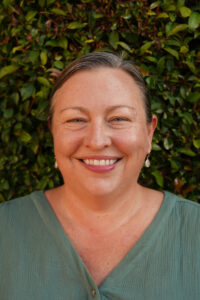From molecules to mountains.
Home > Departments > Science Courses
Science Lab
The primary goal of the Science Department is to provide you with a foundation of scientific literacy necessary to play an informed and intelligent role in our modern technological society.
The department offers a wide spectrum of required and elective courses so that, through exposure to both physical and life sciences, you will be introduced to the problem-solving skills, concrete and abstract ideas and laboratory techniques that encourage an understanding of science.
Featured Course: Marine Ecology
In the Science Department, learning takes place both in the classroom and in the field. You use the fully equipped science labs for a variety of investigations and take advantage of computers to collect and process data efficiently. Classes head outdoors to study the local creeks, chaparral, and nearby tide pools.
If you’d like to pursue a topic in greater depth you can work individually with a faculty member or a professional scientist on a science research project. In recent years, students have designed projects in molecular genetics, nutritional research, and biochemistry.
Science Courses
Physics introduces all Cate ninth-grade students to scientific inquiry and problem-solving. After framing science as a”way of knowing,” students explore fundamental mechanics topics of kinematics, projectile motion, statics, dynamics, momentum, and energy along with wave phenomena of light and sound. Students focus on exercising scientific practices: asking scientific questions and defining problems, planning and carrying out investigations, developing and using models, analyzing and interpreting data, using mathematics and computational thinking, arguing from evidence, and communicating in both verbal and written forms. Students are expected to extract the majority of their learning from these experiences and from each other with teachers serving as guides and coaches. With these scientific and metacognitive tools, Cate ninth-grade students leave the course with a firm conceptual understanding of physics and the nature of science in preparation for Chemistry and Biology at Cate. Instructional methods follow a guided inquiry approach where students are expected to do science — collaboratively explore phenomena, seek answers and solutions, find patterns, and develop and use models to predict the future. Required for all ninth-grade students at Cate.
Coastal and Marine Ecology is a rigorous second year, college-level biology course, with additional field and lab requirements, that examines a wide variety of marine ecosystems, from the nearby intertidal and kelp forest systems to distant reefs and deep ocean ecosystems. Focusing on local coastal ecology, students will gain an appreciation for biodiversity and sustainability of marine ecosystems through field inquiry practices as well as classroom studies. With an emphasis on how abiotic factors impact ecological relationships and resilience, students will consider human impacts throughout the course. Students will begin to read primary scientific literature, compose annotated bibliographies, and communicate their findings in the form of scientific papers or presentations. Due to the rigor and pace of this course, there is an additional required time commitment which may include fieldwork. Limited space available; students will be required to prioritize course requests during registration. Open to juniors and seniors who have completed three years of laboratory-based high school science (physics, chemistry, and biology) and demonstrated high achievement and interest in science coursework. Prerequisite: Advanced Biology in the fall trimester.
Molecular Genetics is a rigorous second year, college-level biology course of study that examines the biochemistry of the gene and the applications of current biotechnology. Students will begin with evolution and the foundations of the molecular structure of DNA, and the mechanics of DNA replication, protein synthesis, and gene expression. Subsequently, the more complex topics of gene regulation, non-coding DNA, RNA interference, and epigenetics will be explored. Students will become proficient with current biotechnological skills and techniques involving DNA extraction, gel electrophoresis, the polymerase chain reaction, DNA sequencing, and genetic engineering.
Throughout the course, students will consider and discuss the ethical dilemmas associated with the development of these revolutionary ideas and techniques. Due to the rigor and pace of this course, there is an additional required time commitment. Limited space available; students will be required to prioritize course requests during registration. Open to juniors and seniors who have completed three years of laboratory-based high school science (physics, chemistry, and biology) and demonstrated high achievement and interest in science coursework. Seniors who have completed Advanced Biology: Human Transmission Genetics will be given preference. Prerequisite: Advanced Biology in the fall trimester.
Vertebrate Embryology is a rigorous second year, college-level biology course, with additional lab requirements highlighting examples of developmental processes in several animal model systems. The goal of this course is to guide students through the study of vertebrate embryonic development from gametogenesis and fertilization to early organogenesis through inquiry, analysis, and experimentation. Students will apply concepts from the Claim-Evidence-Reasoning model in order to demonstrate understanding as to how specialized cells form from undifferentiated precursors with emphasis being placed upon mechanisms of control and integration of function. The class will explore the fundamental embryological concepts of proliferation, regulation, regeneration, cleavage, blastulation and gastrulation. Finally, students will discuss the role of the changing environment and exposure to teratogens on the development of the embryo. Laboratory exercises include experiments with living sea urchins, and nematodes as well as microscopic examination of various sections of embryos from frogs and chicks with schematics from D. melanogaster. Open to juniors and seniors who have completed three years of laboratory-based high school science (physics, chemistry, and biology) and demonstrated high achievement and interest in science coursework. Prerequisite: Advanced Biology in the fall trimester.
Inquiry in Science
Meet the Faculty
 Science Department Chair
Science Department Chair
craig_bouma@cate.org / 805-684-4127 x220
BS, University of California, Irvine
MS, Oregon Health & Science University
EdD, Loyola Marymount University
Appointed: 2015
Craig Bouma brings decades of experience in science education and leadership to Cate. After 18 years at Loyola High School of Los Angeles, where he served as a science teacher, department chair, and football coach, Craig joined Cate as Science Department Chair. He has played a pivotal role in implementing inquiry-based curriculum and instruction programs.
At Cate, Craig teaches physics, biology, oceanography, and specialized courses like California Coast and Science for Life. A recipient of the Centennial Excellence in Teaching Fellowship (2024) and the Bill New ’59 Distinguished Teaching Chair (2022), Craig is passionate about fostering scientifically literate students and engaging learners through innovative methods.
Craig lives on the Mesa with his spouse, Christine, who teaches K-5 science at Crane School. Their sons, Will ’22 and Henry ’25, are both Cate graduates. Craig enjoys spending time at the beach, walking his dogs, surfing, and snowboarding.
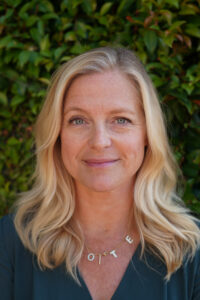 Biology Instructor
Biology Instructor
beth_caylor@cate.org / 805-684-4127 x140
BS, University of Virginia
MS, Indiana University
MS, College of William and Mary
Appointed: 2016
Despite previously living on the East Coast her entire life, Beth Caylor has always suspected herself to be a native Californian. She joined Cate after five years at The Lawrenceville School, where she was a Science Master and Assistant House Master.
Throughout her career, Beth has been drawn to opportunities to share her passion for environmental and biological sciences through teaching. She has been fortunate to lead field programs to The Island School in the Bahamas, develop and implement a program in Hawaiian Oceanography for Johns Hopkins Center for Talented Youth, and teach Caribbean Oceanography aboard SSV Ocean Star in the Sea-mester Global Program. Beth has M.S. degrees in science education and curriculum studies from Indiana University as well as in marine science from the College of William and Mary. As an undergraduate at the University of Virginia, she participated in the Semester at Sea program and dual-majored in biology and studio art.
Beth teaches advanced Biology in the Science Department, leads the SCUBA program, and lives on campus with her husband Kelly and son Holden.
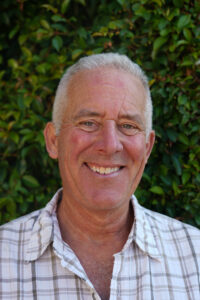 Science Instructor
Science Instructor
Outdoor Program Director
paul_denison@cate.org / 805-684-8409 x278
BA, Middlebury College
Appointed: 1984
Paul Denison has dedicated his career to Cate as a teacher, administrator, and coach. He teaches a wide range of science courses, including Biology, Chemistry, Human Biology, and Advanced Genetics, as well as American Wilderness. In addition to his classroom work, Paul has held various administrative roles, including Director of the Outdoor Program, Associate Director of Admissions, and Dean of Students. He has also served as a dorm head for High House and Cook House.
A seasoned coach, Paul has led varsity and JV soccer teams and coached varsity lacrosse, including the State Champion team in 1994. An ACA Certified Whitewater Instructor and Wilderness First Responder (WFR), he brings his expertise to Cate’s Outdoor Program.
Paul is the inaugural holder of the Ellis Teaching Chair and has received the Burleigh Pattee Award and Spittler Cup. He lives with his wife, Downing, and their two children, Jack and Tessa ’19, in the house in which he grew up.
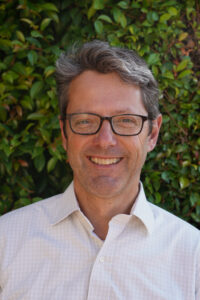 Science Instructor
Science Instructor
james_kellogg@cate.org / 805-684-8409 x259
AB, Amherst College
PhD, Harvard University
Appointed: 2007
Dr. James Brewster Kellogg has been a dedicated member of Cate’s faculty for 18 years, teaching physics, computer science, and chemistry. With a PhD in geophysics from Harvard University, where his research focused on computational geodynamics, Jamie also has a strong background in scientific coding. Before joining Cate, he worked as a teaching fellow at Harvard for seven years and taught at Lakeside School for one year.
Jamie is the current holder of the Colin Day Chair for Interdisciplinary Studies (2019–present) and serves as a board member at Riviera Ridge School (2024–present).
He lives on campus with his wife, Susannah, and their son, Sam, Cate Class of 2028. Their older son, Willie, graduated in 2023. In his free time, Jamie enjoys honing his latte art, baking sourdough bread, spotting Sam on boulder problems, and playing guitar.
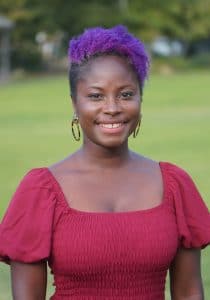 Biology Instructor
Biology Instructor
Multicultural Programming Coordinator
kadeine_peterson@cate.org / 805-684-4127 x136
BS, Marist College
MS, Cornell University
Appointed: 2021
Kadeine Peterson brings a strong background in genetics and genomics research to her teaching at Cate. She began her career specializing in fertility studies using mouse models before transitioning into education, with previous roles at Hotchkiss and Phillips Exeter.
At Cate, Kadeine co-created and serves as the Multicultural Programming Coordinator, organizing events such as the MLK Jr. Day of Celebration.
Kadeine lives on campus with her husband, Coach Josh Peterson, their three children, Jack Maverick, Kingston, and Karys, and their beloved dog, Rocco, the oldest dog on campus.
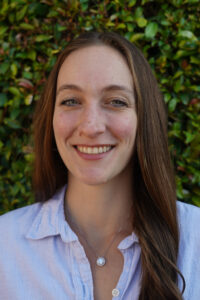 Physics Instructor
Physics Instructor
BS, William and Mary
Appointed: 2024
Aurora Santangelo brings a dynamic teaching background in physics, math, engineering, and robotics to Cate. She began her teaching career in 2019 at Sage Ridge School in Reno, Nevada, where she also led outdoor trips and served as a grade-level dean. Aurora’s academic pursuits include research with NASA Langley during her undergraduate studies, contributing to the LOFTID mission.
At Cate, Aurora teaches 9th-grade physics, an honors physics electricity and magnetism course, and she is excited to share her passion for yoga as a teacher in the Spring.
Originally from Brooklyn, N.Y., Aurora lives on the Mesa with her fiancé, Michael Cvetich, and enjoys contributing to Cate’s vibrant community.
 Chemistry Instructor
Chemistry Instructor
cece_schwennsen@cate.org / 805-684-8409 x259
BS, Luther College
BS, University of Nebraska, Omaha
MS, University of Nebraska, Omaha
MS, University of Nebraska, Lincoln
Appointed: 2009
Cece Schwennsen brings decades of experience in education to the science program at Cate. Before joining the community, Cece taught at Millard South High School in Omaha and Milken Community School in Los Angeles. She also served as an Einstein Fellow at the National Institute of Standards and Technology (NIST), overseeing high school researchers and coordinating college-level research initiatives.
Recognized for her excellence in education, Cece is a recipient of the Tandy Teacher of the Year Award, the Presidential Award for Excellence in Math and Science Education, and National Board Certification. She specializes in curriculum design, chemistry education, and assessment.
Cece lives in CHE with her two cats, Ash and Goyangi. In her free time, she loves baking, often taking on the challenge of creating unique student birthday treats.
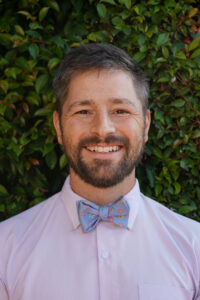 Physics Instructor
Physics Instructor
Dean for Faculty
Troy_Shapiro@cate.org / 805-684-4127 x260
BA, Brown University
Appointed: 2017
Troy Shapiro brings a rich background in science education and outdoor programming to Cate. He began his teaching career at Middlesex School in Concord, Mass., and later taught physics and chemistry at Jay Pritzker Academy in Siem Reap, Cambodia.
An avid outdoorsman, Troy is heavily involved in the Outdoor Program at Cate where he coaches rock climbing and lacrosse. He lives in Cook House West with his wife, Ellen.
Chemistry Instructor
Cassia_Sonderleiter@cate.org / 805-684-4127 x242
BA, Occidental College
MA, CSU Northridge
Appointed: 2017
Cassia Sonderleiter brings extensive experience in science education and leadership to Cate. She began her career as a science teacher, department chair, and STEM coordinator at The Archer School for Girls, where she worked for a decade. Cassia then served as Director of Science Instruction for Alliance College-Ready Public Schools and was the founding principal of Citizens of the World Charter Academy.
Passionate about fostering student growth, Cassia is completing her EdD in Educational Leadership at UCLA.
Cassia lives with her husband, two young sons, and their dog, Masa. In her free time, she enjoys cooking and gardening.
